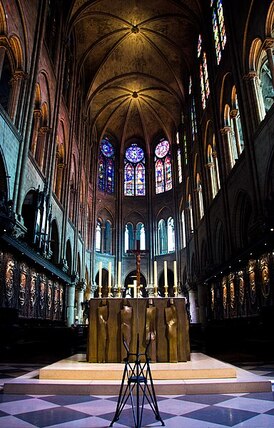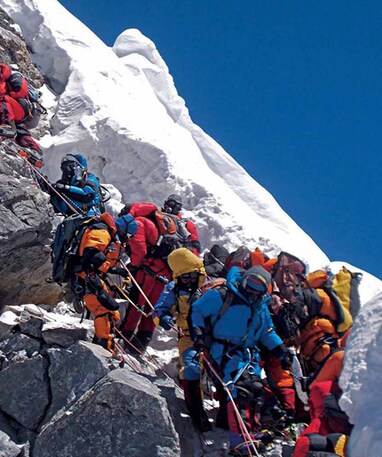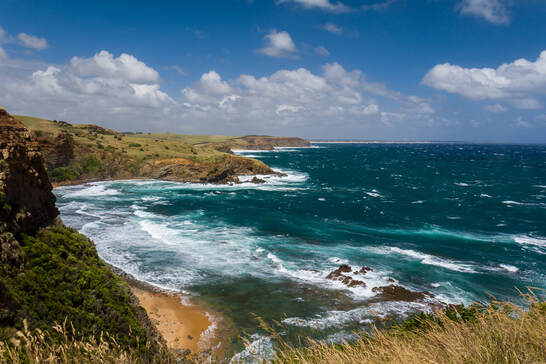 Notre Dame Cathdral. Photo: Kriti Shankar
Notre Dame Cathdral. Photo: Kriti Shankar WHEN my daughters were seven and nine, I took them to Paris and along the way visited Notre Dame. I remembered the cathedral from my youth as a place of worship, and a place which held free organ recitals every Sunday, a magnificent place of beauty and, for me, wonder. Of course, I loved the architecture and the rose windows and the grandeur of the pipe organ, but more than anything else I loved the reverence of those who took themselves to this sacred space, and I loved it that the centuries of that respect seemed to have been absorbed by the stones.
Two decades later, when I re-visited Notre Dame, this time with my children, the sacred place was packed with tourists, American, Japanese, and others less identifiable, and the atmosphere was competitive, with most trying to capture the altar or the rose windows with their cameras. I say it was competitive because grown-ups were pushing and shoving each other and even the children.
I mention this now, because we live in a time when mankind has tried to dispense with the sacred, driven it deep into the vaults of the past in favour of i-phones and racing around with one’s ass on fire. Gone is the time to reflect, replaced with capturing some digital facsimile of our personal experience, usually with our mug front and centre as if we were larger than nature; gone is the time to pause and feel the wonder of the experience, the fragrance on the breezes, the sounds of nature; gone is the spirit, which resides within us, drowned out by the chaos of commerce. All that seems left, some days, is money.
To be honest, I don't care about possible business opportunities, and I don't mind saying so. Life is not about business, it is about living and, to me, it is about being one with the world around us. Of course, we need to make a living but do we have to destroy the things we love in order to pay our bills? Do we have to find those things in nature which are beautiful and trash them? There are already businesses aplenty that will receive benefit from those who take the trouble to make all or part of the walk -- pubs and cafes and many other enterprises in Kilcunda, San Remo, Inverloch, Cowes and Wonthaggi.
 Climbers queue on Mt Everest.
Climbers queue on Mt Everest. But really, is it not an affliction to view nature as an economic opportunity? Have we not already destroyed far, far too much? Have we not monetised nearly every aspect of life? I was watching a program the other day on Stonehenge and the pushing and shoving that’s going on there, one side suggesting that the highway needs to be put in a tunnel so the traffic doesn’t spoil the experience handed down to us by the ancient Druids, and the other saying the tunnel will destroy the archeological history of the site. Why hasn’t someone suggested that they just move the damned highway and leave the site alone? Is there something wrong with staying away from something special? The good people of Venice are saying ‘Basta!’. They have had enough and are trying to save their city. Their first goal is to stop the cruise ships from docking with each ship releasing its 3,000 gawking tourists to add to the disintegration and clutter of their beautiful city.
There is a battle going on in the west of the state. Someone has come up with a great idea to build a high-end resort on Cape Bridgewater. There have been similar proposals around our part of the south coast which fortunately have been defeated. Like the people of Venice, I say Basta! Enough!
The beauty of Victoria’s beaches is inspiring, but one of its greatest gifts for us is that it is possible to find solitude there. I would rather leave it alone than contribute to its destruction, and I would suggest that most of humanity who loves nature knows how avaricious humanity can be. As for capitalism’s drive for endless growth, I say, to hell with business.
I say also please … please let us begin to cherish and preserve the beauty of our planet. Keep the walk as it is. Maybe I’m already too old to make it up and down the hills; if so, I will still remember the half-dozen times I have made the journey and I will still cherish the beauty. There isn’t a pipe organ along the walk, but I have taken a seat often and just listened to the music of nature. I don’t mind if others make the journey but it is a journey which should be made with respect. To turn this little piece of nature into an industry is indeed sacrilege.
I spent six months once hiking in New Zealand. In the beginning, it seemed bizarre to me that one had to book for some of the hikes, but I came to realise the benefits. The goal in NZ was to preserve the beauty and they decided that the only way to do that was to limit the number people on the trails each day. It worked then and I hope it is still working. And perhaps that is an answer for us, should the walk become too popular.
‘Listen to the locals’
June 4, 2021 - Yallock-Bulluk coastal trail plan suffers from lack of local knowledge
